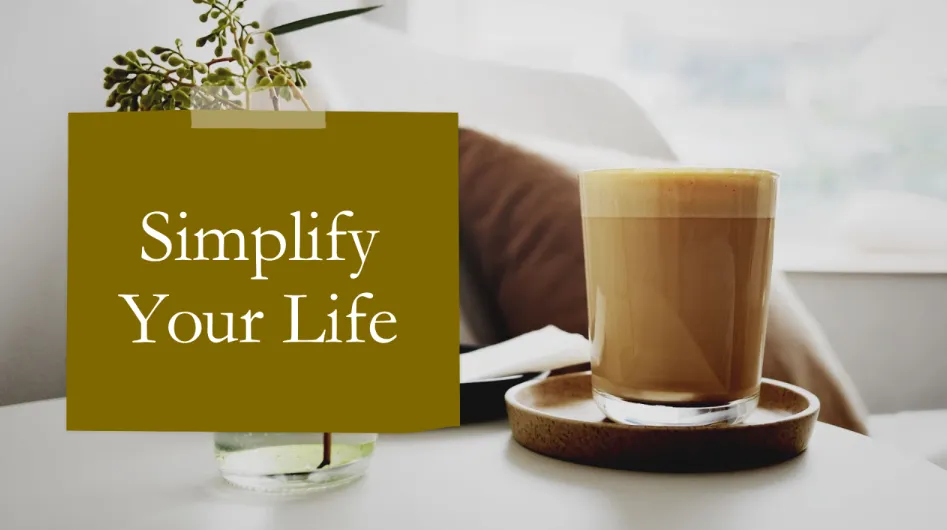In recent years, minimalism has emerged as a lifestyle trend that goes beyond decluttering physical spaces. It’s a mindset, a philosophy, and a way of living that encourages individuals to simplify their lives in order to focus on what truly matters. For many, minimalism has become an essential tool for improving mental health. The connection between minimalism and mental well-being has gained considerable attention, as individuals seek to alleviate the overwhelm of modern life, reduce stress, and achieve greater emotional balance. This article explores how adopting a minimalist lifestyle can improve mental health and why this movement is becoming more popular in today’s fast-paced world.
What is Minimalism?
Minimalism is often misunderstood as merely owning fewer possessions or living in a bare, sparse environment. While reducing physical clutter is certainly an element of minimalism, the concept encompasses much more than that. At its core, minimalism encourages people to prioritize their time, energy, and resources on what truly matters to them. This can include focusing on meaningful relationships, pursuing passions, and creating a life that aligns with personal values, rather than being bogged down by material possessions or societal expectations.
Minimalism advocates for living with less to make room for more — more joy, more purpose, more peace, and more mental clarity. It’s about choosing quality over quantity, whether it be in the things you own, the experiences you have, or the relationships you maintain.
The Connection Between Minimalism and Mental Health
The growing mental health crisis in modern society — marked by high levels of stress, anxiety, depression, and burnout — has sparked a search for ways to cope and find relief. One of the answers that many people are turning to is minimalism. By simplifying our external environments and internal lives, we can create more space for peace of mind, creativity, and emotional well-being. Here are several key ways in which minimalism can improve mental health:
1. Reducing Mental Clutter
In today’s world, we are constantly bombarded with information, notifications, and distractions. Our minds are filled with a never-ending stream of thoughts, worries, and to-do lists. This mental clutter can lead to feelings of stress, anxiety, and overwhelm.
Minimalism helps reduce mental clutter by encouraging us to focus on what truly matters and let go of distractions. When we simplify our possessions, we also create mental space. The process of decluttering our environment has a direct effect on our minds, allowing us to think more clearly and focus on what’s important. This sense of clarity can be incredibly calming and help reduce feelings of anxiety.
2. Decreasing Decision Fatigue
Every day, we are faced with numerous decisions — what to wear, what to eat, how to spend our time, and more. The constant need to make choices can lead to decision fatigue, which diminishes our ability to make good decisions and drains our mental energy.
Minimalism alleviates decision fatigue by reducing the number of options we need to consider. For example, having a capsule wardrobe of versatile clothing items simplifies daily decisions about what to wear. Similarly, minimizing the number of commitments we take on allows us to have more mental energy to devote to things that align with our values and priorities.
With fewer decisions to make, our minds can focus on the important things, leading to better mental clarity and reduced stress levels.
3. Improving Emotional Well-being
Minimalism can have a profound impact on our emotional well-being. Many of us accumulate possessions, relationships, or commitments out of a sense of obligation or societal expectation. These things often don’t bring genuine happiness, but instead contribute to emotional baggage, stress, and anxiety.
By embracing minimalism, we are empowered to let go of the things that no longer serve us, whether that’s material possessions, toxic relationships, or unnecessary commitments. This process of letting go can be deeply freeing and can help us cultivate a sense of inner peace. When we focus on what truly matters — such as our health, relationships, and passions — we create space for positive emotions and reduce emotional clutter.
The emotional benefits of minimalism are also linked to the concept of gratitude. When we own less, we often develop a deeper appreciation for the things we do have. This shift in perspective can enhance our overall emotional health, fostering a sense of contentment and reducing feelings of lack or dissatisfaction.
4. Promoting Mindfulness
Minimalism encourages a more mindful way of living. By stripping away excess, we can live more intentionally and be present in the moment. Whether it’s enjoying a cup of coffee without distractions or spending quality time with loved ones without the interruption of technology, minimalism helps us be more aware of the present.
Mindfulness is a well-established practice for improving mental health. Studies have shown that mindfulness can reduce stress, anxiety, and depression. When we focus on the present moment, we can break free from the cycle of negative thoughts and worries that often plague our minds. Minimalism naturally supports mindfulness by encouraging us to live more simply and focus on what’s truly important.
5. Enhancing Time Management
Another way minimalism supports mental health is by improving time management. With fewer distractions, possessions, and obligations, we have more time to invest in the things that bring us joy, fulfillment, and relaxation.
Time is often considered one of our most valuable resources, and minimalism encourages us to use it wisely. By focusing on fewer, more meaningful activities, we can reduce the feeling of being spread too thin and create more time for self-care and relaxation. This extra time can also be spent on hobbies, exercise, or other activities that contribute to mental well-being.
6. Fostering a Sense of Control
In an increasingly chaotic and fast-paced world, many people struggle with a lack of control over their lives. Minimalism offers a way to regain that sense of control by consciously choosing what enters our lives and what we let go of.
When we curate our possessions, relationships, and daily routines, we take ownership of our surroundings and our time. This sense of control can lead to a feeling of empowerment and a greater sense of security, which can significantly improve mental health. Knowing that we have the power to shape our lives in a way that aligns with our values can bring peace of mind and reduce feelings of helplessness.
7. Encouraging Self-Reflection and Personal Growth
Minimalism provides the opportunity for deep self-reflection and personal growth. By simplifying our lives, we create space to reflect on our goals, desires, and values. This self-awareness can lead to greater clarity about what truly matters, allowing us to make intentional choices that align with our authentic selves.
The process of evaluating what to keep and what to let go of encourages introspection and personal development. Minimalism challenges us to confront our attachments and consider why we hold on to certain things or relationships. This kind of reflection can promote mental growth and contribute to a more fulfilling and balanced life.
Why Minimalism Is Gaining Popularity
The rise of minimalism can be attributed to several factors, including the overwhelming influence of consumerism, the effects of modern technology on our mental health, and the increasing recognition of the importance of mental well-being.
In a world where we are constantly encouraged to acquire more, do more, and achieve more, many people are finding that simplicity is the key to happiness and mental peace. The minimalist movement offers an antidote to the consumer-driven culture and an opportunity to reconnect with what truly matters.
Additionally, the increasing awareness of the link between mental health and lifestyle choices has contributed to the rise of minimalism. As people seek more sustainable, intentional ways of living, minimalism offers a pathway to greater mental clarity, emotional well-being, and inner peace.
Conclusion
Minimalism is more than just a trend; it’s a transformative lifestyle that can significantly improve mental health. By simplifying our possessions, commitments, and daily routines, we can reduce stress, promote mindfulness, and create more time for what truly matters. Minimalism encourages a mindful, intentional approach to life, helping us to focus on quality over quantity and prioritize our well-being.
In a world that often feels overwhelming, minimalism offers a path toward greater mental clarity, emotional peace, and personal fulfillment. As more people embrace this lifestyle, the mental health benefits of minimalism will continue to be a powerful reason for its rise in popularity.


